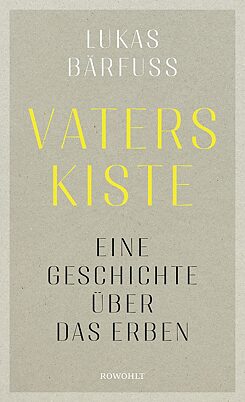Cherrypicker
Unpleasant Remains
The only thing Lukas Bärfuss inherited from his father is a banana crate with unknown contents. Using his own family history, he reflects on inherited injustice in general and on how it could be eliminated.
Lukas Bärfuss never dared to look inside the old crate that accompanied him for 25 years. But now he wants to tidy up, declutter. For a time, it brings to mind a sinister Pandora’s box, but then he resolves that ancient mythology “wouldn’t be helpful; that superstition was ridiculous and irrational.” In fact, the dirty and musty-smelling box was filled with unpleasant remains: there are bills, promissory notes, letters from welfare offices, courts and correctional institutions. His father was the black sheep of the family; he served time in prison and at the end of his life he lived – and died – on the street.
The Swiss author is not unfamiliar with documents like them. He lived his younger years in precarious circumstances; “on the fringes of this society, which didn’t bother me much.” He, too, was homeless for a time and knew that one mishap, one little act of carelessness would have been enough and he would have been “irretrievably entangled; would have ended up in jail.”
Origin delusions
In his new book Vaters Kiste, Bärfuss goes far beyond the personal. His father story becomes a meandering essay. He puts our “origin delusions” up for negotiation, going all the way back to the Old Testament, even to the invention of writing, to ask himself and us “What was so appealing about explaining, justifying, excusing power over other people, and thus the violence exercised against them, through origins?”Bärfuss takes a critical look at the social constructs of origin and identity. For him, the worst example of this was the Germanic cult of the Nazis. The myth of the Teutons, he says, is just that: a myth, an asserted truth that goes back to Julius Caesar’s writing about the Gallic War, but was in fact an invention. This is reminiscent of historians Eric Hobsbawm and Terence Ranger’s ideologically critical concept of “invented traditions.”
In the further course of the book, Bärfuss comes to terms with his reading experiences. He notes that many of the books he reads are merely “testimonies to the prevailing conditions,” “shaped according to the penchant of the times.” Next to the Bible, he considers Darwin’s principal work On the Origin of Species to be the most influential on the emergence of Western, capitalist society. This book is “a collection of evidence,” but narratively constructed so that his contemporaries could understand it. For the sake of clarity, Darwin presents nature as a kingdom, from which dynastic thinking and the struggle for survival derive. However, any choice of narrative form creates blind spots, focuses and narrows the perspective: Darwin “does not describe the context, and if he does, it is in the parameters of selection, annihilation and reproduction. Cooperation does not exist; he did not develop a science of collaboration.”
Crazy or dangerous
The strength of Vaters Kiste is that it questions the seemingly unquestionable. Private property, for example, is accepted by us as God-given, although it is only a concept; a relationship between things and people, “and every relationship changes over time.” Property and succession are connected, “property is to a large extent unearned,” because it is inherited. And the regulations of inheritance could also be changed. Bärfuss concludes, “We need a different grammar and other terms for family, for origin, but above all we need a different law of succession.”Many of Bärfuss’s insights are not new, but his booklet is stimulating and passionately written. He formulates class-struggle demands, for example for more “democracy in the relations of production.” But he realises that today, after the end of communism, someone who criticises private property is “considered crazy or dangerous.” Therefore, he finally returns to Darwin and hopes for evolution rather than revolution. Perhaps the dominance of private property can be broken in a slow process by strengthening the idea of the common good. The cooperative, for example, is an existing, good model for a somewhat fairer world, in which private property is increasingly transformed into common property.
At the end of the reading, despite all the wealth of words and ideas, a sad residue remains: the gap between reality and the language used to speak and write about it. Bärfuss knows this too: “There’s reality and there’s language. How one is distinguished from the other remains dreadfully uncertain.”
Lukas Bärfuss: Vaters Kiste. Eine Geschichte über das Erben
Hamburg: Rowohlt, 2022. 96 p.
ISBN: 978-3-498-00341-8
You can find this title in our eLibrary Onleihe.

